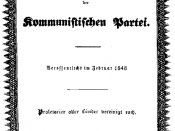Globalization as we know it can be described as the increasing mobility of capital through the transfer of goods and services, as well as the greater flow of information across borders due to the improvements in technology and the opening up of new markets. Karl Marx, a 19th century political and economic philosopher would argue that this globalization makes the workers better off than before, as with the increase of capital comes the slow increase in wages, and the industrialization which comes with it the escape from rural life, and a higher standard of living.
Marx believed that with capitalism comes the higher standard of living, but believed that globalization was disastrous to the working class, because of the position it puts him in, that of a commodity, just like any other commodity. Capitalism transforms the workers life into nothing but an extra cost, a cost in which the capitalist has to pay, but does all he can to reduce the amount he has to pay.
He is to be bought and sold, his whole life is work, and the wages he receives only allow him to be able to survive as a wage-laborer. Marx constructed a system that gave the oppressed an explanation for their difficult position and hope for their future. Marx wrote that economic forces drove history. Marx believed that, "it is not the consciousness of men which determines their existence, but the contrary, it is their existence which determines their consciousness." (Brummett p.652)
Businesses must always be revolutionizing the means of production to find cheaper, faster, and more efficient ways to build up their capital. As Marx put it "The need of a constantly expanding market for its products chases the bourgeois over the whole surface of the globe, it must nestle everywhere, settle everywhere,



Review
I thought this was a very informative essay that has helped me to write my paper. Thank you.
1 out of 1 people found this comment useful.